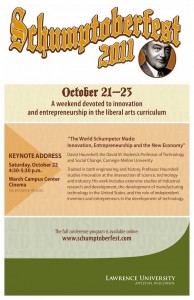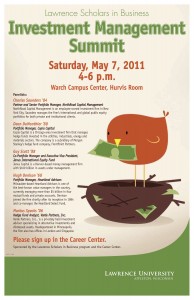Thirty of us returned last night from another very successful Lawrence Scholars in Business trip to Chicago. Most of yesterday was “entrepreneurship day.” Before lunch, we went to ICNC, an incubator hosting over a hundred start-ups. We got to visit two of them, Souldier and Element Bars. The latter was a winner on Shark Tank! Our gracious hosts at ICNC were Steve DeBretto and Tom Cassell. Tom teaches the Entrepreneurship Practicum at the ACM Chicago Entrepreneurship program. The deadline for Fall 2012 has been extended, so it’s not too late to think about making this part of your next year. If you liked the two-day immersion experience we got in Chicago, you’ll love the term-long immersion experience you’ll get in the ACM program. Consider taking advantage of this great opportunity. The ICNC is not just a space to practice whatever your craft is, but it is also a community of entrepreneurs, with a strong support network.
After lunch at the Berghoff, we went to the Merchandise Mart to visit the just-launched hot new tech-incubator 1871. If your start-up might need a truck to pull up to your space, ICNC is where you’d want to be. But if you are a software start-up, you’d want to be at 1871, the intersection where the explosion of ideas takes place. Dozens of start-ups, six venture capital firms, four universities, many prestigious sponsors, and a number of mentors come together in a space designed beautifully for creativity.






